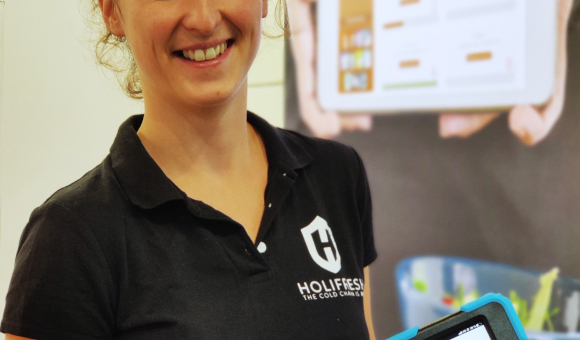
Wallonia ticks all the boxes for a successful logistics project, as it is ideally located in the heart of Europe and has infrastructure, multimodality, skills and available space. What is less well known is that the Walloon region also has many assets in the fields of logistics and the transport of perishable goods. The SIAL in Paris, the world's food industry event, is an opportunity to make this known to the sector's manufacturers.
Space is a scarce commodity. The French group STEF, a specialist in the transport and storage of refrigerated food products, has been dealing with warehouse saturation for several years. The constraints weighing on the agrifood industry are constantly increasing, leading more and more manufacturers to outsource their logistics. The group, which already had three sites in Wallonia, in Liège, Courcelles and Saintes, decided last spring to build a new 10,000 m2 refrigerated warehouse in Tubize. This is a significant investment that could create between 50 and 150 additional jobs.
The land reserve is not the only asset that attracts investors. "One of the reasons we continue to invest in Wallonia is that it is easier to find competent personnel who are ready to support us in our development in Belgium," explains Gauthier Morel, Director-General of STEF Belgium.
Multimodality is another strong point in Wallonia. It has connections to road, air, rail and river, with the autonomous port of Liège which is the largest Belgian inland port and the third largest inland port in Europe.
The Jost Group, which specialises in air, road and sea transport, customs, forwarding and warehouse logistics, has set up a 300,000 m2 site on the site of the Liège trilogiport. This access to rail and waterways allows it to continue reducing its CO² emissions. In line with Wallonia's desire to reduce its emissions by 35% by 2030, the Logistics in Wallonia competitiveness cluster also encourages its members to participate in multimodal transfer projects (Multimodal Wallonia), innovation projects (Innovation Pitch) and emission reduction programs (Lean & Green).
Air transport, which remains the fastest and safest way to guarantee the freshness of the most fragile produce, is also included. Liège Airport, the sixth largest cargo airport in Europe, specialises in the transport of this type of goods. 25 countries export perishable goods to Liège Airport.
These goods include cut flowers, for example, but especially food products that require controlled temperatures (some between 2° and 8°, others between 15° and 25°). Very delicate foods, such as asparagus and mangoes, which can easily spoil, enjoy modern and perfectly adapted infrastructures. Liege Airport also has a border control post (BCP) called the Fly'in Farm. This is where the veterinarians of the Belgian Federal Agency for the Safety of the Food Chain (FASFC) perform most of their testing, but they travel to the airport warehouses daily to carry out their work. The airport is in constant contact with veterinarians, importers and transporters to ensure that the entire logistics chain is efficient, thus limiting the risk of loss and damage to a minimum. The airport has a centralised infrastructure with 11,000 m² divided into four large units with variable temperatures. This is where goods are dismantled. However, for more flexibility, each handler has a veterinary control point in their warehouse.
Wallonia also has many companies whose services are directly aimed at agrifood operators and Horeca customers. One of these is Holifresh, which is active in the cold chain and currently present at SIAL in Paris. Launched in Louvain-la-Neuve in 2017, this company offers connected solutions for the real-time monitoring of critical parameters (temperature, humidity, CO²). "The sensor installed in a truck or a cold room, for example, will actually follow the situation in real time and digitise the temperature readings that will then be accessible and easily readable on an online web platform", explains Caroline de Pret, Sales Manager for Belgium and France, from the Holifresh stand at SIAL. "Our sensors work without wifi, which ensures continuous operation and optimal safety".
Other Walloon stakeholders are also part of the cold chain, such as Bidfood, whose largest distribution centre in Belgium is based in Thuin. The site has three storage departments: room temperature, positive cold (2 to 4°C) and negative cold (-18°C). Like H. Essers (Courcelles), Sud-Fresh (Rhisnes), which also specialises in the temperature-controlled transport of food products, also has all its vehicles equipped with two separate compartments, allowing the simultaneous transport of temperature-controlled products in positive and negative cold.
Sud-Fresh has four logistics distribution centres for storage. Products that are very sensitive to temperature and should not have temperature shocks can be placed in quarantine. Packaging is possible at different temperatures (e.g. chocolate).
In addition to transport and temperature-controlled storage, these companies also provide all the reverse logistics services, i.e. the return of goods, which is an integral part of the logistics cycle for this type of product.
Apart from the cold chain, many Walloon stakeholders also provide a complete transport and logistics service for goods, including food products that do not require cold chain maintenance. They include Brauntruck AG (Eupen), Vincent Logistics (Herstal), Van Mieghem Logistics (Saintes), Garsou-Angenot (Thimister-Clermont) and Magetra (Eupen, Hermalle-sous-Huy and Bierset), which specialises in the transport and logistics of wine and all its by-products, such as corks, delicatessen items and other spirits.
With storage space, access facilities, multimodality, state-of-the-art services and cold chain experts, there is everything you need when starting out from Wallonia to ensure food distribution under the best conditions. Several international food stakeholders at SIAL were attracted by the region's logistics ecosystem.
For more information, please contact our logistics experts: logistics@awex.be


